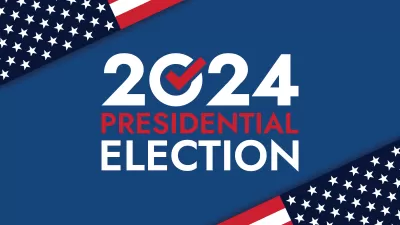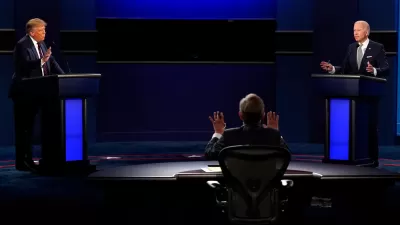The federal transportation spending bill will be up for reauthorization in 2009. The fate of the nation's transportation will hinge on how this bill is reworked, which will largely be determined by who wins this November's presidential election.
"It would take $1.6 trillion over five years to address the nation's infrastructure problems, according to a 2005 report by the American Society of Civil Engineers, which gave the country's system a 'D.'"
"Both presidential candidates have acknowledged the importance of rebuilding the roads and rails, but have offered very different solutions. John McCain, the Republican nominee, advocates shifting financing from earmarks to high-priority projects, while Barack Obama, his Democratic challenger, would create a federally-funded bank to invest in improvement projects."
"Whoever wins will have to address the issue next year since Congress must reauthorize the federal transportation spending law, which expires in September 2009. The current law, approved in 2005, allocates $286 billion to highway and transportation projects."
FULL STORY: Your vote, your crummy highways

Planetizen Federal Action Tracker
A weekly monitor of how Trump’s orders and actions are impacting planners and planning in America.

Restaurant Patios Were a Pandemic Win — Why Were They so Hard to Keep?
Social distancing requirements and changes in travel patterns prompted cities to pilot new uses for street and sidewalk space. Then it got complicated.

Map: Where Senate Republicans Want to Sell Your Public Lands
For public land advocates, the Senate Republicans’ proposal to sell millions of acres of public land in the West is “the biggest fight of their careers.”

Maui's Vacation Rental Debate Turns Ugly
Verbal attacks, misinformation campaigns and fistfights plague a high-stakes debate to convert thousands of vacation rentals into long-term housing.

San Francisco Suspends Traffic Calming Amidst Record Deaths
Citing “a challenging fiscal landscape,” the city will cease the program on the heels of 42 traffic deaths, including 24 pedestrians.

California Homeless Arrests, Citations Spike After Ruling
An investigation reveals that anti-homeless actions increased up to 500% after Grants Pass v. Johnson — even in cities claiming no policy change.
Urban Design for Planners 1: Software Tools
This six-course series explores essential urban design concepts using open source software and equips planners with the tools they need to participate fully in the urban design process.
Planning for Universal Design
Learn the tools for implementing Universal Design in planning regulations.
Heyer Gruel & Associates PA
JM Goldson LLC
Custer County Colorado
City of Camden Redevelopment Agency
City of Astoria
Transportation Research & Education Center (TREC) at Portland State University
Camden Redevelopment Agency
City of Claremont
Municipality of Princeton (NJ)





























